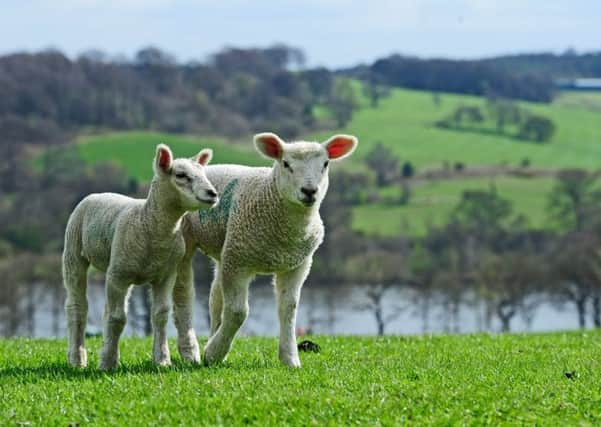Imports and early Easter blamed for low lamb price


Market analysts say the spike in the farm price paid for lamb at Easter has worn off before the supply of new season lambs peaks, largely due to the holiday having fallen earlier this year.
According to levy payers’ organisation Eblex, an increase in imports of cheaper lamb from New Zealand compared to this time last year has also skewed the early season price.
Advertisement
Hide AdAdvertisement
Hide AdIn the week ending April 25, the average new season prime lamb price had fallen by 19.9 per cent and the number of prime lambs entering the market up by 24.7 per cent.
NFU president Meurig Raymond said: “Late April typically sees the numbers of new season lambs increase, with prices adjusting through the season as increased supplies become available.
“However, the last two weeks have seen prices fall by nearly 20 per cent and the rapid decline is symptomatic of the volatility faced by lamb producers. This is extremely worrying, as early lamb requires a premium to cover its increased cost of production.
Early season lamb is a premium product that delivers a top quality eating experience for customers, Mr Raymond said, adding: “If the market does not reflect the higher costs associated with supplying early lamb, sheep farmers will question the long term viability of producing this high-quality and iconic British product for the Easter market.
Advertisement
Hide AdAdvertisement
Hide Ad“Consumers tell us that they want to see British lamb on supermarket shelves today and in the future. I share the anxiety of many sheep farmers about any external pressures that may further depress the price of their lambs. If farmers don’t have confidence in production, then long term supply of home-grown lamb to consumers is going to be at risk.”
The National Sheep Association is also concerned about current market prices.
Phil Stocker, the NSA’s chief executive, said: “When we have seen plenty of farms that have already invested money in their sheep flocks in terms of feed and livestock numbers and for the price to crash in the way that it has done - it’s a real concern.
“It’s all pretty marginal in terms of profitability so this sort of collapse is enough for some to record a loss over the course of the year.”
Advertisement
Hide AdAdvertisement
Hide AdSteve Dunkley, Eblex’s York-based senior regional manager for the North East, said circumstances had conspired to bring about the current lower lamb prices.
“Easter stimulates some extra demand as you expect so we have always seen an improvement in prices at that time. But Easter has been earlier this year and afterwards we always see a slight drop off, but we are seeing a few things happening that are adding to the volatility.”
Mr Dunkley explained: “We are seeing more New Zealand lamb coming in because they have been having a drought, so they are killing their lambs sooner and some of that is ending up over here.
“The positive thing about that is that they are sending their lamb now so there will be less about later in the year which should be good come the next spike in British production in June and July.
Advertisement
Hide AdAdvertisement
Hide Ad“What is also happening at the moment is that most producers are killing old season lambs from last year and selling to the retailers but at some point, maybe in two or three weeks time, there will be a switch from old to new season.
“The retailers don’t buy a few of one and a few of the other because they want consistency on the shelves,” Mr Dunkley said.
The NSA’s Mr Stocker added that current exchange rates, which see the pound’s value holding strong, was reducing demand for British lamb for overseas at present. France is Britain’s biggest customer of lamb exports but the strength of the pound made the meat an expensive product to import, Mr Stocker said.
‘Retailers must back British lamb’
NFU president Meurig Raymond said he was writing to the major retailers to urge them to promote British lamb prominently on their shelves.
Advertisement
Hide AdAdvertisement
Hide Ad“In recent years we have been highly critical of retailers who have promoted imported lamb when British lamb has been at its best and in plentiful supply. Therefore, all eyes will be on retailers to see if they will give our great British lamb pride of place on their shelves,” he said. “Farmers and consumers both want to see home-grown lamb on the shelves this year, and for years to come. We call on retailers to help make this happen.”